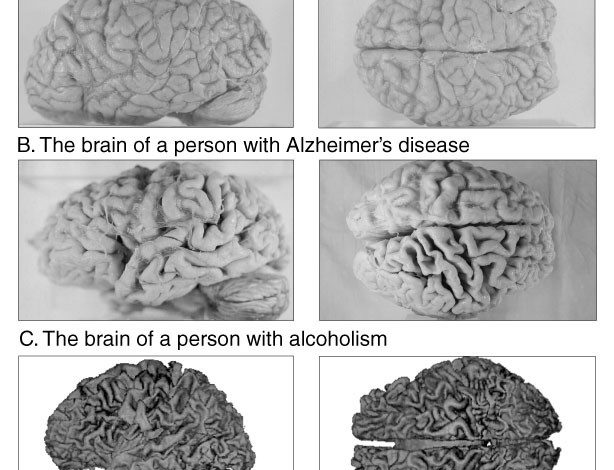Heavy Drinking and Brain Damage: Study Reveals Risks

Heavy drinking and brain damage are critical concerns highlighted by emerging research, revealing the profound impact alcohol can have on cognitive health. Studies show that consuming eight or more alcoholic beverages weekly significantly elevates the risk of developing brain lesions, such as hyaline arteriolosclerosis, which can hinder blood flow and lead to severe cognitive decline. Understanding the effects of alcohol on the brain is essential, especially as heavy alcohol consumption is linked to increased issues with memory and overall brain health. With findings indicating that heavy drinkers have a 133% higher risk of vascular brain lesions compared to non-drinkers, it is imperative to address these alarming trends. This vital research underscores the connection between alcohol and brain function, prompting a need for public awareness to prevent heavy drinking-related health crises.
When we discuss excessive alcohol intake and its ramifications on mental faculties, we are drawn into the interplay between alcohol and brain function. The consumption of significant amounts of alcohol is associated with detrimental changes in brain structure, resulting in cognitive impairments and neurological issues over time. With a growing body of evidence illustrating how high alcohol consumption correlates with brain lesions and cognitive decline, it becomes crucial to delve into these effects for a better understanding of brain health and alcohol’s long-term consequences. As individuals age, the ramifications of alcohol use can escalate, leading to profound memory challenges and associated health risks. It is vital to recognize these dangers to foster better public health strategies aimed at reducing alcohol-related harm.
The Impact of Heavy Drinking on Brain Health
Heavy drinking has profound effects on brain health, often leading to severe cognitive decline. Research indicates that consuming large quantities of alcohol, particularly eight or more drinks per week, is linked with heightened risks of developing vascular brain lesions. These lesions can interrupt normal blood flow in the brain and have been associated with cognitive impairments, including memory issues and diminished problem-solving skills.
In a study focusing on elderly populations, heavy drinkers were shown to have a 133% greater risk of vascular brain lesions compared to non-drinkers. This alarming statistic underscores the necessity for public health interventions aimed at reducing high alcohol consumption to safeguard brain health and prevent cognitive decline.
Alcohol’s Role in Brain Damage and Cognitive Decline
As alcohol crosses the blood-brain barrier, it may negatively alter brain function by impairing memory and cognitive abilities. Consistent heavy drinking can intensify the risk of developing tau tangles in the brain, which are known markers of Alzheimer’s disease. The correlation between alcohol consumption and the emergence of these tangles suggests a potential pathway through which alcohol can induce brain damage.
Moreover, the compounding effects of alcohol and age can precipitate quicker cognitive decline. Former heavy drinkers exhibited noticeable reductions in brain mass and cognitive capabilities, again emphasizing the risks associated with long-term heavy alcohol consumption and its detrimental effects on brain health.
Understanding Brain Lesions Linked to Alcohol Consumption
Alcohol-induced brain lesions, such as hyaline arteriolosclerosis, are significant contributors to the risks of brain health deterioration associated with heavy drinking. These lesions cause blood vessel narrowing leading to impeded blood flow, which can have cascading effects on brain function, memory, and ultimately quality of life.
The findings reveal a stark reality: those engaging in heavy drinking face increased risks not only of vascular lesions but also of various neurodegenerative processes. This correlation accentuates the importance of understanding the biological effects of alcohol on the brain.
Cognitive Outcomes for Heavy Alcohol Consumers
Cognitive impairments linked to heavy drinking are alarming, with evidence showing that heavy drinkers experience substantial declines in both memory and overall cognitive function. In the elderly population studied, the average cognitive decline was evident, showcasing the long-term effects of heavy alcohol consumption and the potential for early onset of dementia.
Furthermore, those defined as heavy drinkers had shorter average lifespans compared to non-drinkers, further emphasizing the stark realities of excessive alcohol use on not just cognitive health, but overall well-being and longevity.
Memory Issues and Alcohol Consumption: A Dangerous Link
Ongoing alcohol consumption correlates strongly with memory issues, particularly in older adults who may already be predisposed to cognitive decline. Studies have suggested that those who consume alcohol excessively may face accelerated memory loss, and this is reflected in brain autopsies revealing significant damage.
The cumulative effects of heavy drinking can lead to irreversible memory deficits, underlining the critical need for awareness of the dangers of alcohol. Public health initiatives aimed at reducing heavy alcohol intake are crucial to mitigate these risks.
The Mechanism Behind Alcohol’s Toxic Effects on the Brain
Alcohol acts as a central nervous system depressant that can alter brain chemistry and structure. The mechanisms by which alcohol inflicts damage include oxidative stress and inflammation, which contribute to cognitive decline. Research highlights that excessive alcohol disrupts the brain’s neurobiology, leading to the acceleration of neurodegenerative diseases.
As understanding of these mechanisms progresses, it becomes clear that preventive measures are essential. Public health campaigns must educate consumers about the risks of heavy drinking and its long-term impact on brain health.
Demographics of Heavy Drinking and Brain Health
Examining demographics reveals that heavy alcohol consumption is not isolated to a single geographic or age group. It is a widespread issue with implications for varied communities. Studies like those conducted by the American Academy of Neurology suggest that interventions should target high-risk groups identified through alcohol usage patterns.
By understanding who is most affected by the negative consequences of heavy drinking, targeted prevention and support services can be more effectively developed to protect brain health across diverse populations.
Long-term Consequences of Alcohol on Brain Structure
Long-term alcohol consumption significantly alters brain structure, leading to a decrease in brain volume and efficiency. Research shows that heavy drinkers often present with shrinkage of critical areas responsible for executive function, memory, and emotional regulation.
These structural changes reinforce the argument for moderating alcohol intake as a means of preserving cognitive capabilities over time, especially among aging populations who are already vulnerable to cognitive decline.
Public Health Strategies to Mitigate Heavy Drinking Effects
To combat the detrimental effects of heavy drinking on brain health, public health strategies focusing on education, prevention, and treatment are essential. Awareness campaigns can inform individuals about the risks associated with excessive alcohol use and promote healthy drinking guidelines.
Additionally, providing resources for individuals struggling with alcohol dependency is crucial in reducing rates of heavy drinking and minimizing the associated risks of brain damage and cognitive decline.
Future Directions in Alcohol and Brain Research
Future research must continue to explore the complex relationship between alcohol consumption and brain health. This includes investigating how varying levels of alcohol intake impact different populations and elucidating the biological pathways that lead to brain lesions and cognitive impairment.
Through ongoing research efforts, we can develop better strategies to prevent heavy drinking and its devastating effects on brain health, ensuring a healthier future for all.
Frequently Asked Questions
What are the effects of heavy drinking on brain health?
Heavy drinking can lead to significant effects on brain health, including the development of vascular brain lesions that impair blood flow and contribute to memory and cognitive problems. Studies have shown that heavy alcohol consumption is inversely related to brain function, heightening the risk of conditions like Alzheimer’s disease.
How does heavy alcohol consumption contribute to cognitive decline?
Heavy alcohol consumption is associated with cognitive decline as it can damage brain cells and reduce brain mass, impacting memory and overall cognitive function. Individuals with a history of heavy drinking often show a notable decline in cognitive abilities, particularly as they age.
Can heavy drinking lead to brain lesions?
Yes, heavy drinking is linked to the development of brain lesions such as hyaline arteriolosclerosis, which narrows blood vessels in the brain. This condition increases the risk of memory impairments and cognitive issues as blood flow is compromised.
What are tau tangles and how are they connected to heavy drinking?
Tau tangles are protein deposits found in the brains of individuals with Alzheimer’s disease. Research indicates that heavy drinkers are more likely to develop tau tangles, signifying a detrimental impact of heavy alcohol consumption on brain health.
Is there a difference in brain damage between current heavy drinkers and former heavy drinkers?
Yes, studies suggest that former heavy drinkers exhibit greater cognitive decline and reduced brain mass compared to current heavy drinkers or moderate drinkers. This implies that past heavy drinking can have lasting effects on brain function even after cessation.
What is the recommended alcohol intake to avoid brain damage?
To minimize the risk of brain damage, it is generally advised to limit alcohol consumption to less than eight drinks per week. Exceeding this threshold significantly increases the risk of developing brain lesions and cognitive impairments.
What role does alcohol play in increasing the risk of Alzheimer’s disease?
Alcohol, particularly in heavy amounts, can contribute to the formation of tau tangles and other brain injuries, which are markers of Alzheimer’s disease. Regular heavy drinking is thus considered a risk factor for cognitive decline and Alzheimer’s.
How much alcohol is considered heavy drinking?
Heavy drinking is defined as consuming eight or more alcoholic beverages per week. This amount is associated with increased risks of brain damage and cognitive decline, according to various studies.
Does age affect the relationship between heavy drinking and brain damage?
Yes, age plays a significant role; older adults who engage in heavy drinking are at a heightened risk for brain damage and its effects on cognitive health compared to younger individuals, as their brains may be more susceptible to injury.
What preventive measures can help reduce heavy drinking and its effects on the brain?
Preventive measures include public health awareness campaigns, access to addiction treatment resources, and encouraging healthier lifestyle choices that promote brain health, such as regular physical activity and a balanced diet.
| Key Point | Details |
|---|---|
| Definition of Heavy Drinking | Eight or more alcoholic beverages each week. |
| Effects on Brain Health | Linked to increased risk of hyaline arteriolosclerosis and vascular brain lesions. |
| Memory and Cognition Impact | Heavy drinking can lead to memory and cognitive impairment. |
| Study Size and Methodology | Examined autopsies of 1,781 individuals with info on their alcohol consumption. |
| Statistics on Brain Lesions | Heavy drinkers have a 133% greater risk of vascular lesions compared to non-drinkers. |
| Tau Tangles Association | Increased likelihood in heavy drinkers and former heavy drinkers. |
| Cognitive Decline | Former heavy drinkers show decline not seen in moderate drinkers. |
| Average Lifespan Loss | Heavy drinkers have an average lifespan 13 years shorter. |
| Public Health Concern | Awareness and prevention measures are crucial due to health risks of heavy drinking. |
Summary
Heavy drinking and brain damage are closely linked according to recent research. The alarming findings indicate that consuming eight or more alcoholic beverages each week can lead to significant brain injury and cognitive decline. The study highlights the pressing need for public health measures to combat the harmful effects of heavy alcohol consumption on mental health.




